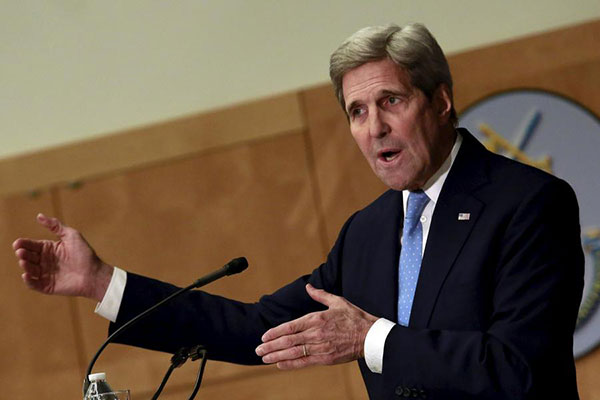Address Sino-US concerns
(China Daily) Updated: 2016-01-28 07:46
 |
|
US Secretary of State John Kerry delivers remarks on the United States foreign policy agenda 2016 at the National Defense University in Washington January 13, 2016. [Photo/Agencies] |
China and the United States have seized the opportunity of US Secretary of State John Kerry's visit to Beijing this week to exchange views on issues of mutual concern, especially those that have stood out between them of late, such as the denuclearization of the Korean Peninsula and the South China Sea disputes.
Both countries need to lay a good foundation for bilateral ties as the relationship between Beijing and Washington has assumed a significance that goes far beyond the bilateral scope, and they are yet to have a meeting of minds on a number of issues.
In his joint news conference with Kerry on Wednesday afternoon in Beijing, Foreign Minister Wang Yi said China does not seek to militarize the South China Sea and it will honor its word. This should help eliminate wild speculation and unwarranted accusations about China's strategic intentions in the waters.
As a country with the right to protect its territorial sovereignty in the South China Sea, China's pledge of not militarizing the waters highlights its commitment to regional peace and stability.
The US also needs to clarify its strategic intentions in the waters, as its so-called freedom of navigation operations have become a new source of friction between the two countries.
As for the Korean Peninsula nuclear issue, both sides have agreed to make "accelerated efforts" to reach an agreement on a new United Nations Security Council resolution on the Democratic People's Republic of Korea. China has said it supports necessary responses from the council as both the authority of the world body and the international nuclear non-proliferation regime should be upheld.
China's stance on Pyongyang's nuclear program is always consistent: It opposes to Pyongyang's nuclear tests and says denuclearization of the Korean Peninsula needs to be achieved through negotiation and dialogue.
For the two countries to properly handle their differences, they need to show the spirit of flexibility and gradually bridge the gaps in a constructive manner until consensuses can be reached.










